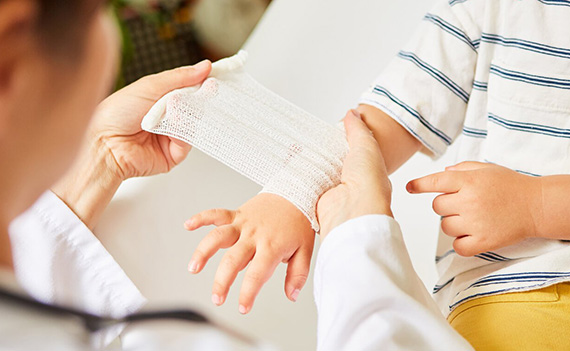Paediatric First Aid Training Course
Delivery methods available:
Face-to-face

Duration
12 Hours
Time
Times vary to suit your needs
Cost
Enquire with our team
Capacity
Max. 12
Upcoming Courses
FAQs about Paediatric First Aid Training Course
What is Paediatric First Aid training?
Paediatric first aid training aims to develop delegates’ knowledge and practical skill to provide first aid treatment to infants and children. The course requires learners to assess and manage critical situations. This approach ensures that delegates feel confident and competent to apply their newfound knowledge in real-life emergencies. In addition, the course meets the requirements of the Early Years Foundation Stage framework. Therefore, it is a popular course with those who work with or mind children, such as early years workers or registered childminders. It can also be a valuable course for others who do not have a professional involvement with infants and children, such as parents and grandparents.
What does a Paediatric First Aid course cover?
The level 3 course has two mandatory units that learners must complete. The first unit is titled emergency paediatric first aid. It covers the roles and duties of an aider and how to administer first aid to unresponsive, choking, or bleeding babies and children. The second unit is titled managing paediatric illnesses, injuries, and emergencies. It covers the theory and practical skills required to provide effective treatment for a range of medical conditions.
What is the syllabus of Paediatric First Aid course?
Qualification unit 1
- Role and responsibilities of a paediatric first aider
- Assessing a paediatric emergency
- First aid for an unresponsive infant or child
- First aid for a choking infant or child
- First aid for an externally bleeding infant or child
- First aid for an infant or child suffering from shock
- First aid for an infant or a child with bites, stings, and minor injuries
Qualification unit 2
- First aid to an infant or a child with suspected injuries to bones, muscles, and joints
- First aid to an infant or a child with suspected head and spinal injuries
- First aid to an infant or a child with conditions affecting the eyes, ears, and nose
- First aid to an infant or a child with an acute medical condition or sudden illness
- First aid to an infant or a child who is experiencing extremes of body temperature
- First aid to an infant or a child who has sustained an electric shock
- First aid to an infant or a child with burns and scalds
- First aid to an infant or a child with suspected poisoning
- First aid to an infant or a child with anaphylaxis
How is a Paediatric First Aid course assessed?
Level 3 Paediatric First Aid courses are assessed via practical demonstrations and two multiple choice theory-based papers. The trainer observes the practical demonstrations throughout the course. There are six practical assessments for this qualification. Unit one theory-based assessment is 25 minutes long, and unit two is 40 minutes long. The pass mark is 11/15 and 18/25, respectively.
How long does a Paediatric First Aid course take?
The duration varies based on the level. For example, the Level 3 course is 12 hours and is typically delivered over two full classroom-based days. On the other hand, the Emergency Paediatric first aid course is shorter at 6 hours. In addition, there are awareness level courses available such as the Essentials of Paediatric First Aid course. This short course is an informal non-regulated course aimed at families and is 2 – 3 hours long.
Who needs a Paediatric First Aid course?
The Early Years Foundation Stage framework recognises this course. Due to this recognition, it is most appropriate for those who work with children and infants, such as registered childminders, creche, and preschool workers. However, those without occupational involvement can also undertake and gain valuable lifesaving skills for situations in which they may encounter a paediatric emergency in a personal capacity.
Why is Paediatric First Aid training important?
Appropriately trained paediatric first aiders are legal requirements for all regulated childcare settings. The owners and occupiers of these establishments have a legislative responsibility to ensure that adequate first-aid resources exist. They must ensure that someone is always available.
